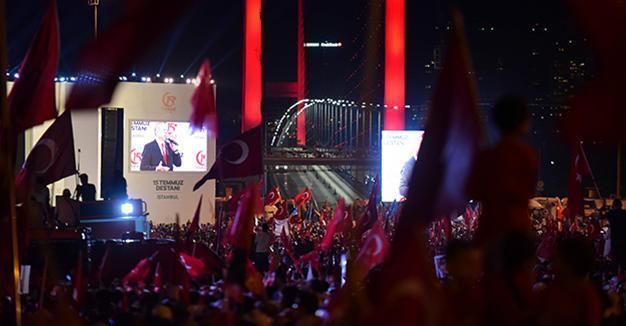Looking at the anniversary of July 15 through the indictments
 I have been writing reviews about the main indictments regarding the July 15 coup attempt for a while now. I can say that a great part of my work hours consist of reading the indictments.
I have been writing reviews about the main indictments regarding the July 15 coup attempt for a while now. I can say that a great part of my work hours consist of reading the indictments.As I read these texts every day and come across new details of the coup night that I did not know, I am further shaken by the fact of how Turkey bounced back from the verge of big chaos on the night of July 15. I should confess that I am shocked further as I see the dimensions of the planning in front of me, the gigantic size of the organization that conducted this and its bizarre structure as well as its operational ability.
It scares me how this organization has wrapped through every part of the system. It has penetrated into all capillary vessels of the body and has done all this in full secrecy and slyness. I am at a loss for words at the fact that this big design’s step-by-step progress towards its target has been overlooked and political and state institutions have shown a great deal of inadequacy in realizing the danger.
All the paths in this design are still leading to the big organization at whose center sits the Islamic preacher Fethullah Gülen, residing in the U.S. state of Pennsylvania.
Thus, it is an irrational situation unique to Turkey that some theories about July 15 can be brought up above this naked truth and the solid facts in indictments.
If Major O.K. had not gone to the Turkish National Intelligence’s (MİT) headquarters in Ankara’s Yenimahalle district on July 15, 2016 at 2:30 p.m. and made a denunciation indicating that an assassination would take place against the intelligence chief Hakan Fidan, and the putschists had started to carry out the coup at 3:00 a.m. (on July 16) as they had forecasted, we would probably have woken up to a totally different Turkey on the morning of July 16, 2016. If the putschists had won the first round, it would not have guaranteed their success in this attempt. Our country would have probably witnessed a very bloody internal conflict spreading over a long period of time.
To take a stand against July 15 is the most basic necessity of our belief in our country, in protecting our lives, in democracy and in the superiority of the law. In this context, it is one of Turkey’s main priorities for those who are responsible of the coup attempt to be held accountable by the justice system and pay for this big atrocity. In parallel, to cleanse the state institutions of this terror organization named the Fethullahist Terrorist Organization (FETÖ) and to lead a determined and strong struggle against this organization are also integral parts of this vital priority.
These priorities should be Turkey’s target above parties, with none of the parties or institutions having a monopoly on them.
In return, it is worrisome to see a strong cloud of dust covering these high priorities when we look at the political discussions conducted regarding this topic, the tension dominating these discussions and executions occupying the agenda on the first year anniversary of July 15.
There are many reasons for this. One of these is that the state of emergency has been maintained over time since its launch on July 15, 2016 in the face of the coup attempt and FETÖ, but has moved away from its initial purpose and spread in a way to include almost any scenario of opposition.
It is not possible to associate the dismissal of academics, teachers, intellectuals and journalists from their jobs, who are in no way connected to FETÖ, the extensive unjust treatment, the serious increase shown in the violations of rights, and problematic decisions and executions on the judiciary front, justified by the struggle against FETÖ.
For example, for a journalist like Kadri Gürsel, who is my close friend who confronted Gülenists without fear in a period when everyone was throwing flowers at them, who defied them, to be in prison today over charges of having supported FETÖ, casts a dark shadow upon the plausibility of the fight against FETÖ in my eyes. Kadri Gürsel is just one of the countless examples that can be given.
One of the most important results of these executions is that unfortunately, a problematic perception disconnected from truths has also started to settle in the foreign world regarding July 15. This cloud of criticism abroad created by the rights violations and controversial judiciary practices in Turkey, have started to push the July 15 coup attempt into the background and alter the perception of the coup attempt in the international arena.
There should be no doubt that it is mostly the Gülen terror network and its extensions abroad who have been especially pleased with this situation.
There should be a big national consensus in Turkey regarding July 15. Indeed, right after the coup attempt, a consensus about this had emerged in Turkey, a rare situation. Unfortunately, we have fallen far from this atmosphere of consensus in the first anniversary since the damnable coup attempt.
We can guess that the putschists are rejoicing because of this as of July 15, 2017.











